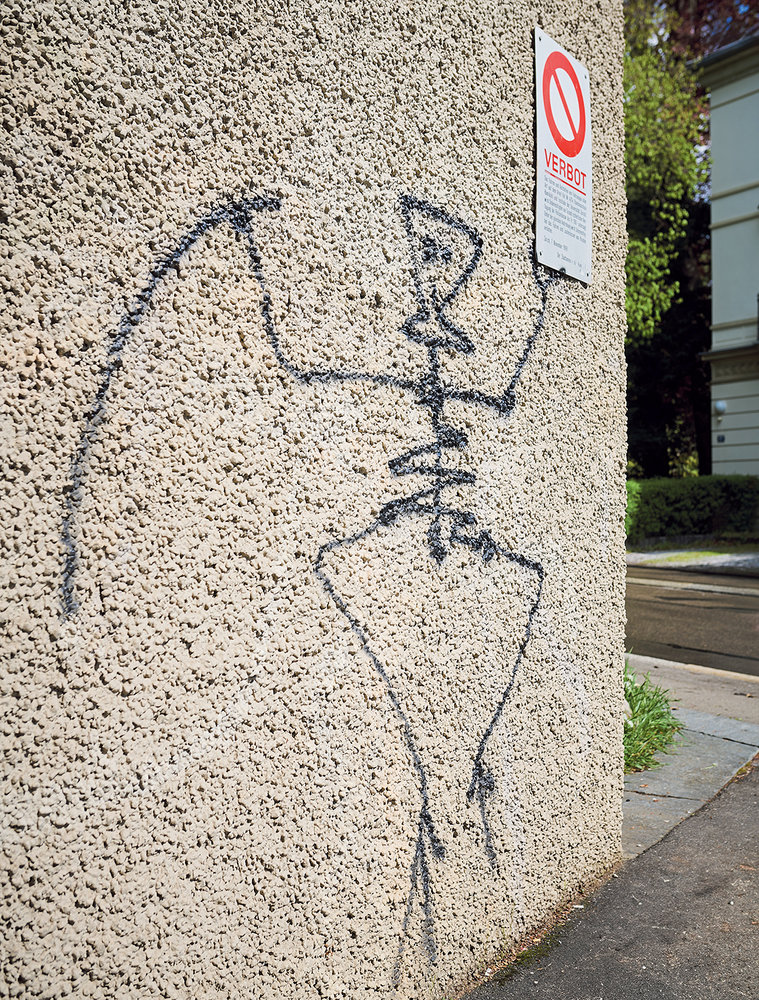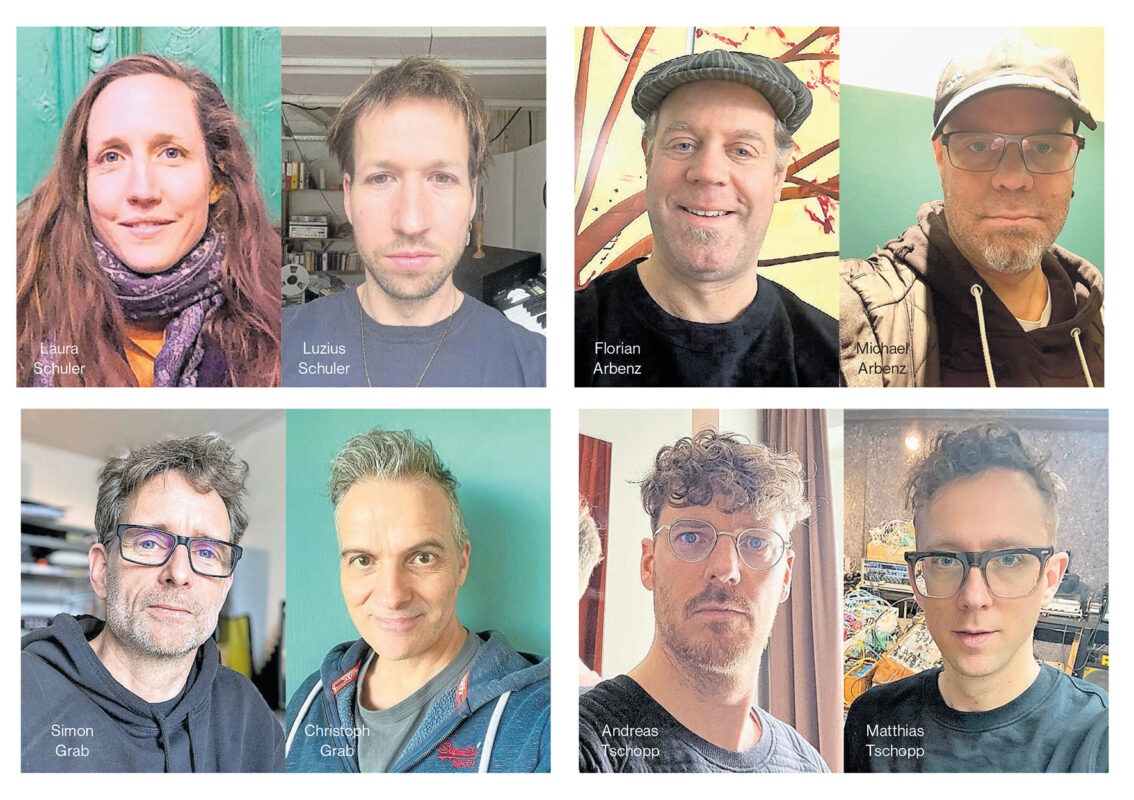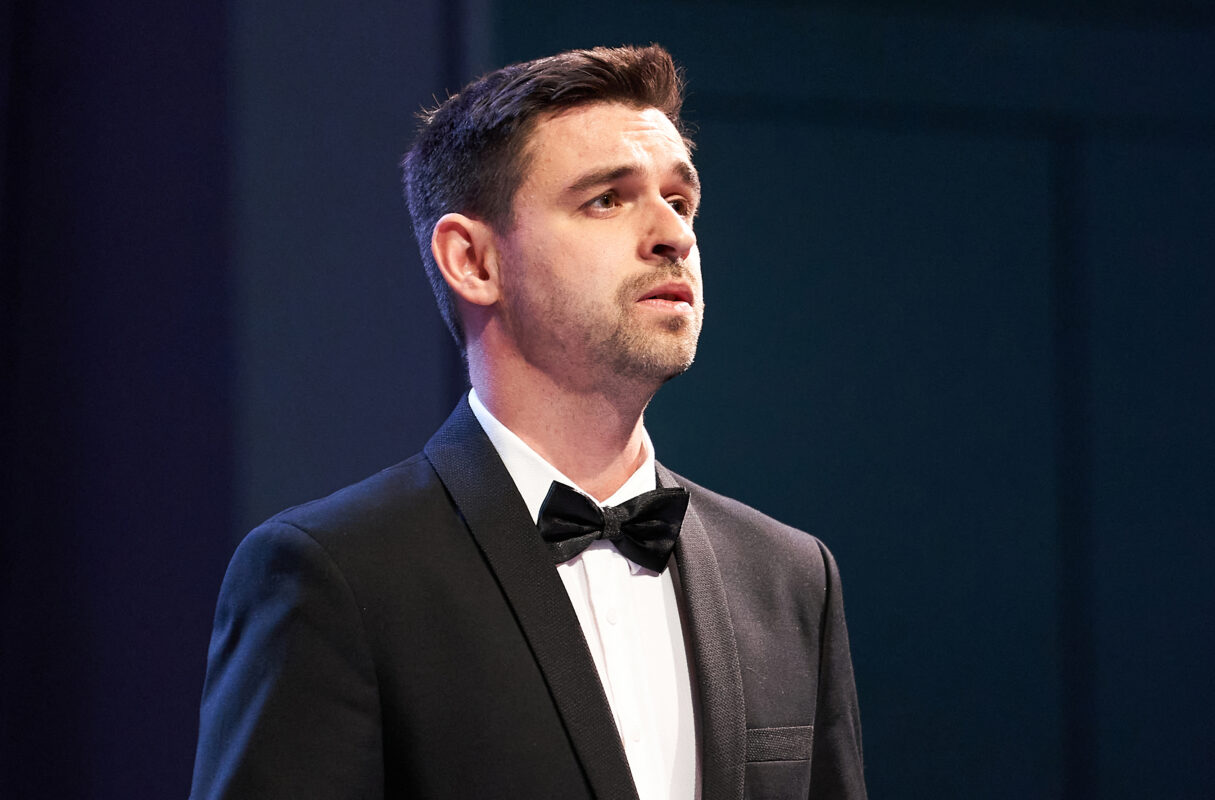Heavy Metal - Resistance training for the big deadline
Detailed version of the interview with art historian, author, ZHdK professor and heavy metal fan Jörg Scheller in the SMZ 6/2024 issue - with a link to a playlist at the end.
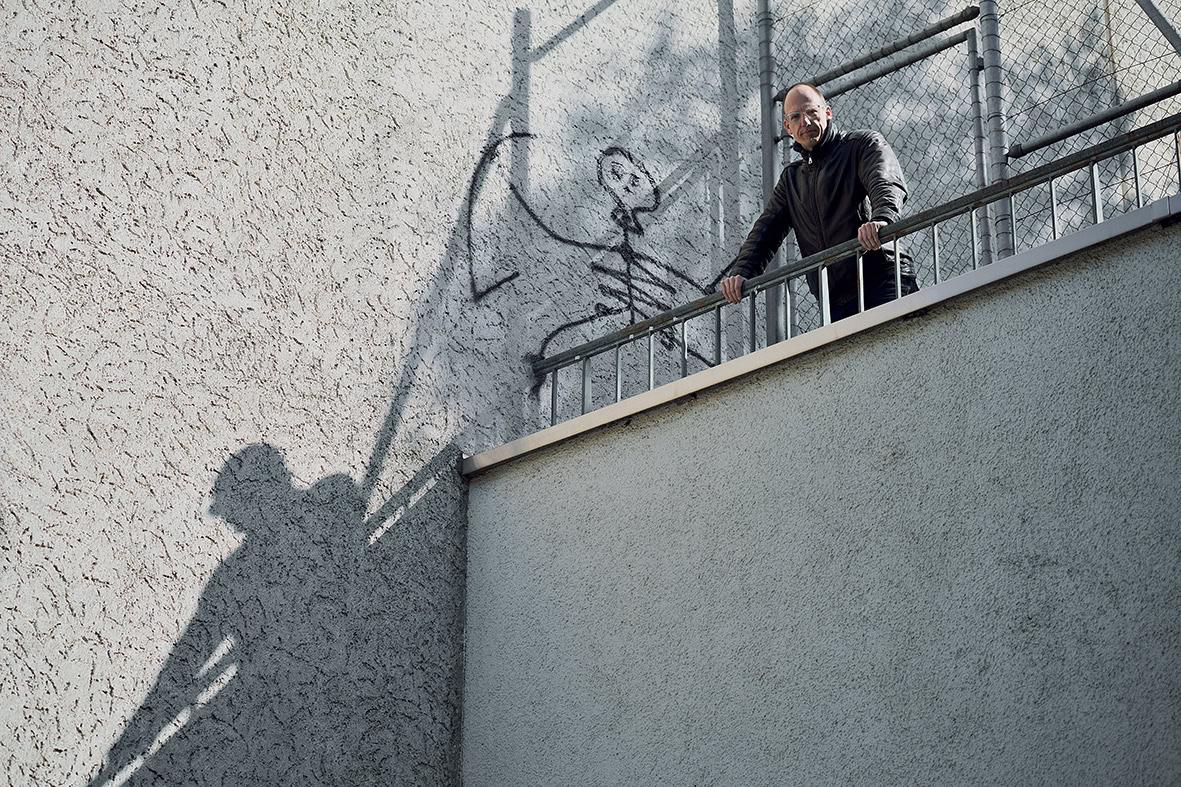
What kind of T-shirt are you wearing?
Jörg SchellerKvelertak, Black 'n' Roll, Norwegian black metal band that combines black metal with rock influences and thus has something rather life-affirming and enthusiastic about it. Entombed were the pioneers of Black 'n' Roll.
Wonderful, while we're on the subject of definitions. What is power metal?
More like heroic tenor, bold chords, pathos, Tolkien-reader milieu. More like the couch potato/insider corner (smiles).
Aren't they all?
Metal variants associated with core and punk tend to be a bit more street.
What is grindcore?
Rather activist, strongly associated with punk, very avant-garde in that it is about the dissolution of form. The form in metal is actually always very stable. Unlike in radically experimental genres, metal actually always maintains a certain form of stability. A safe machine. You have dissolution of boundaries, ecstasy and intensity, but always on a secure industrial basis.
Sludge metal?
That's where I personally slowly drop out, with these endlessly stretched hyper-blues variations. It's almost too much art for me. It becomes experimental and anti-pop. What I always liked about metal was that it's actually pop after all, even if the metalheads don't admit it, and at the same time it's pop against pop. I found that an interesting tension. Judas Priest. They were always totally affirmative with regard to the pop industry, marketing, image, branding, and at the same time they always had something transgressive about them.
Your book ("Metalmorphoses - The improbable transformations of heavy metal", Franz-Steiner-Verlag, 2020) I gather that you are a big Judas Priest fan. In retrospect, it seems amazing that it took so long to find out that the singer and band leader was gay.
It's a wonderful story with Rob Halford, the "Metal God". He even had the title trademarked! The leather god par excellence has been parading around in front of fans in a leather fetish gay costume for decades, for all to see. There were rumors, but there were rarely any problems. In the 90s, when he came out, it was easy. METAL IS STILL ABOUT MUSIC AND NOT JUST ABOUT IDENTITY.
Apocalypse - it's kind of a "glass half full, glass half empty" phenomenon. The end of the world. On the other hand, it's only really starting now, now we're in God's kingdom, the hardship is gone. How do you see that?
I'm actually quite a convinced apocalyptic, because you realize that if you don't have end-time pressure, you won't get anything done. It starts with a very banal deadline. The apocalypse is actually just one of those big deadlines. Nothing works without deadlines. An anecdote from the town I come from, a small Pietist town in the Bible Belt of Baden-Württemberg, where the Pietcong, the hard Pietists, live: this small town was founded in 1819 as an ideal Pietist town. They had somehow calculated that the apocalypse would begin in 1836. The town was chronically in debt - now, of course, you can't face the Messiah in debt. In other words, everything had to be right with their municipal finances by 1836. As a result of this esoteric, metaphysical event, they made a huge effort in the world and actually managed to get their finances in order in time. Unfortunately, the Messiah did not come, but the city was now functioning.
Great, and the city is still standing! But they must have fallen into a terrible emotional hole when the world didn't end after all.
I don't know how to deal with that either. But that's the nice thing, you can always say: God's ways are inscrutable - and that's that. Responsibility? The Lord just does what he wants. The apocalypse is delayed.
Setting the apocalypse as a deadline for a specific goal: could this also be interpreted as an attempt to gain a foothold in a world in which we somehow feel lost?
Yes, I think it's a form of resistance to reality. The apocalypse doesn't just mean the end of the world, it's the promise of a much better future. According to the Bible, the city of Jerusalem descends, a city of transparent gold. It's not a bad place to live. God himself will also move in. Everything will actually be pretty good - for those who are allowed to live there. And if you're living in a time when things aren't going so well, then you at least need a utopian pretense of something else to cling to. That may seem totally esoteric and irrational, but you can't do without it. I think that's what religion used to provide: an image that you can cling to. And there's nothing wrong with that at first, it was just an instrument of power to keep people down in earthly life. While the guys in the castles had a good time.
Which leads us straight to the classic situation of every teenager. As a teenager, you're always insecure. So a rock god like the singer of Judas Priest comes in handy.
Yes, yes. And above all, metal gives you a kind of stability aesthetically alone. It's a transgressive form of pop music, one that breaks with previous conventions, but at the same time still promises stability. And that's different to grindcore, where all structures are completely destroyed, or sludge or drone, where there's actually no form left. Metal still offers orientation and stability, and at the same time it is a rebellion. That can be interpreted as a lazy compromise, but maybe I've been living in Switzerland too long - I don't actually think there's anything wrong with a compromise.
Can you remember the moment when you heard a metal record for the first time?
I bought my first one as a teenager in Gerlingen in a shopping center when the family did their weekly shopping. There were still CDs to buy. We walked past all the colorful covers - and there was a black one in the middle. It was one of those five million Motörhead compilations, From the Vaults. Somehow, I don't know why, I really wanted to have it. I was totally blown away by it when I got home. The priest's son had a record player and metal records, Guns 'N' Roses, Appetite for Destruction and Helloween, Keeper of the Seven Keys Part 1 and Part 2, I think, and I was completely blown away. You could tell that something new was about to begin. You'll never get away from the poison that was dripped into your ear.
A pastor's son, that was of course also a sign - Lemmy (note: Motörhead leader) was that too ...
Yes, a sign, yes, it was wanted from the very top.
At 14, you had the right outfit and started your first metal band. What was it like with the pietists around you, did they cut you off from then on?
We cut each other off. We lived in two worlds next to each other. That's why there weren't actually that many encounters.
Was there no techno faction?
Yes, there were. We had them at school. They were the ones who were always hanging around the bank in the morning with sleepy eyes. They were really into partying. Then there were the punks, I didn't like them back then, they were so broadcast-conscious, always knew what was right and wrong, always knew where the enemy was. Knew what to do. There was already the Middle East issue back then, just like today, solidarity with the Palestinians and so on. Not much has changed. They reminded me more of the religious, the dogmatists. The metalheads, on the other hand, were more introverted. Not so much the loud, forward-pushing, super self-confident ones, but as a metalhead you really listened to music, spent hours memorizing lyrics, tried to understand the lyrics where the lyrics weren't shown, tried to understand what this and that sub-genre was all about - all activities that you did alone, at home for yourself. Or you struggled with the technical challenges in the rehearsal room.
There have been - and still are - efforts to create a fusion of metal and classical music. Deep Purple, for example, tried to do that. Various Wagnerian works, where I always had the feeling that they were also motivated by a kind of feeling of inferiority. They wanted to be taken seriously by the "serious" musicians, to show that they could be just as virtuosic as concert violinists. Did that ever attract you?
That's an interesting question, because we had a falling out in the band after a year or a year and a half. I wanted to stay primitive, I just wanted to shout around, I didn't want to do any vocal training and I didn't want to improve. The others went more down the classic rock virtuosity route, took excessive lessons, developed themselves tremendously and were then technically very strong. The band actually broke up as a result. In this respect, I can answer the question with a no. I didn't feel the temptation. We then had another similar story with a Krautrock band called longjumpmin, we called it "upscale middle-class experimental rock with a strong technoid edge" and had a super-anarchic phase at the beginning. After a few years, there were ambitions within the band to become more technical, more virtuosic, but it didn't work out so well, it became a bit more boring. But I also practise, I play bass, mainly. And to play metal, you need a certain level of expertise to generate the speed and the heaviness.
In the book, you describe heavy metal as a free space in which the delights of adolescent fascination need not be suppressed. Metal gave the daydreams of those times, which were never completely overcome, a resonating space. Do you still experience it that way now?
Yes, yes. I think it's actually quite important that you don't bury certain experiences or feelings you had during puberty at some point. Because those are the ghosts that will haunt you later. In metal, you can keep the dreams, energies and utopias from this time of awakening alive somewhere. And that's probably what makes metal a bit embarrassing. Where people say: For God's sake, there's a 50-year-old in a leather suit on stage singing about some mythical dragon. But I think this embarrassment also has something innocent about it. Something that once flashed you as a 12-, 13-year-old. And that's what Lemmy once said: he plays what he played because it affected him so much as a teenager, triggered such a feeling that he wanted to keep it. He doesn't want to get away from it.
In other words, total freedom from the compulsion to be cool. On the other hand, you have a quasi-sectarian adherence to certain rules, especially in these different metal genres. A paradox?
That bites. But I always compare it to Switzerland. There's a confederation called Heavy Metal, but in this confederation there are federal states, some of which couldn't be more different. That clashes, of course. And they all have their own tax laws, health insurance costs different amounts everywhere, it actually clashes all the time, and yet at the same time you somehow belong together. You realize that when you read a metal magazine - Rock Hard, Metal Hammer -Everything is brought together. Grindcore, power metal, death metal, black metal, everything side by side. The media alone creates a sense of togetherness. In this respect, it perhaps reflects a liberal-pluralistic-democratic spirit, where people fight because there really are differences, but ultimately it's not entirely sectarian.
People have already killed themselves, haven't they?
Haha, yes, but then rather rarely. At least it's not part of the daily routine.
Apparently, in Norway at the time (note: the Norwegian death metal scene burned down churches, which had to be guarded around the clock; there were also ideologically motivated murders among the musicians), it was all about defending a certain understanding of freedom. In the eyes of this scene, organized religion and its churches stood for the opposite of freedom. Did I understand that correctly?
And they became religious themselves. Because they basically did nothing different from the early Christians who destroyed the temples of the pagans. I think this furor of the Scandinavian extreme metallers is actually atypical of metal. Because they became really activist. They really wanted the church out of the country. Classic heavy metal tends to operate in a symbolic space. Metallica, Megadeth or Judas Priest, Slayer, there's no politically active movement associated with them. It was different with the black metallers. People who are convinced that they have found what is good, true and right often tend towards violence. Because you want to enforce it when you have the holy grail in your hands, so to speak.
There is the theory that the apocalyptic provides stability in a society that is almost too well off. You also write that from Mexico to Moscow and South America, heavy metal, folk metal, medieval metal and all these types that have the apocalyptic in them are on the rise. Is the world losing itself in the swamp of prosperity?
You would have to have prophetic skills. What this new, widespread distribution perhaps indicates: We are living in a time of upheaval, everything is open at the moment, we don't really know in which direction it will tip. Whether everything will become more authoritarian, whether democracy will return, how the climate will develop. There are a lot of variables at play, there are a lot of risks at the moment. Metal is a music that can express this. Where all these issues, even dark ones, have always been dealt with very openly. Maybe that's why heavy metal is growing globally, because it's simply a medium for the apocalyptic, which is currently relevant again. I found that very interesting during the coronavirus pandemic. People often said: We never expected this. I say: You just haven't heard enough metal! There's always talk of pandemics, epidemics, crises, death, corruption, rot. If anyone was prepared, it was the metalheads. In this respect, perhaps the spread of metal is an aesthetic resistance training for these hardships of life that are now imminent, and an attunement to the apocalypse in the sense of a downfall and a new beginning.
The whole aesthetic - on the one hand the black album by Motörhead and Spinal Tap, let's not forget, and on the other hand these post-Rodin-post-medieval epic-biblical-snake-fighting swordsmen - you could say it's like fantasy literature. But from the point of view you just described, it could also be seen as an analysis of the present on a symbolic level.
Basically the same as it was with the Bible. The last book of the New Testament, the Revelation of John, is actually pure fantasy literature. With spectacle, horror, everything you could wish for. But of course there are also symbols and metaphors for the present day. Metal is very similar. You're perhaps not describing the situation as directly as in hip-hop, where it's more about: Hey, this is happening on the street, this is what's going on in the neighborhood. Metal wraps the present in apocalyptic metaphors. Maybe that's why it also seems like - how should we put it? - like religion. Why has the Revelation of John spread so globally? These are simply images that work well in Africa, Asia, Europe, everywhere. Images that trigger strong emotions. And since metal also operates with such images, it has also become a trans-national genre. I think these are ciphers for the present. You see the present through the ciphers of the mythological, the fantastic. And so metal is actually already pretty well prepared for times of censorship. With censorship, you can't express yourself directly, you always have to take detours, conceal the meaning of what you're saying by means of certain codes and symbols. Metal has been doing this for a very long time.
Where does the often self-parodic vocabulary, the names, the album titles come from? Great, the creative energy that flows into these bizarre word and name creations!
That's the funny thing about metal. On the one hand, it's often meant very seriously, the grand gesture, the monumental. On the other hand, you can often sense a form of self-irony. You can't parody a name like Megadeth - even without the "a"! Or Metal Church. The self-irony shows that we already know what we're doing, so over the top and exaggerated that it becomes grotesque. The aesthetic is taken to its limits, where it subverts itself. That happens in metal. But there's also stupid metal, where people do it with holy seriousness. Metal is actually always too much. There are also counter-movements. Metallica were a counter-movement to hair metal, they wore jeans, T-shirts, sneakers and leather jackets. They wanted to get away from the baroque gestures. Metal is probably just so pluralistic that, like in the church, there are all the different denominations wrestling and arguing with each other. Sometimes it goes into the parodistic, embarrassing, sometimes into the purist, protestant.
Are there any metal bands that are influenced by John Cage?
There are a few cover versions of 4'33'' of metal bands on YouTube. They just stand there in a metal look. Other than that, I can't think of anything. Maybe in the Mr. Bungle corner, they at least have knowledge of Fluxus and stuff.
In another book (Bill Peel, "Tonight it's a World We Bury - Black Metal, Red Politics, Repeater Books, 2023) shows how all these sub-styles of metal are extremely important for the socialization of teenagers. And at the same time, how bands that become so important to this socialization that they enjoy success beyond the boundaries of the genre lose their credibility in the process. On the one hand, it takes hard work to be accepted by a genre group as belonging to it. On the other hand, every such grouping needs young blood in order not to fossilize. Another paradox...
Yes, yes. That brings us back to a bit of anarchism. I've always been interested in bands that try to keep their own economic reins in their hands and "practice what you preach". Not like Rage Against the Machine, who somehow have a communist program in their lyrics and then sign to a major label. I always liked people like Henry Rollins, who are on the road with their own record company, with their own publishing house. That's more in line with the anarchist DIY ideal.
It was similar in punk. Someone who was successful was automatically considered suspicious. I assume Metallica, for example, also grew up against this background. It must be a strange feeling to suddenly be traveling the world as a super-rich giant!
That, in turn, is a very symbolic situation for today's society. It's often the business punk that makes it to the top, not so much the well-behaved ones who conform to the laws of the group, but rather the somewhat offbeat, more original, but not quite so radical ones. Metallica fit in perfectly. Metal-radicalized, but at the same time smart business people and in this respect "the best of both worlds". Transgression - faster, harder - and at the same time very business-minded. It's an old game in metal: someone makes it to the top, and immediately there are accusations of sell-outs. Just like in hip-hop.
This is also a kind of apocalypse.
The hellish fall of the damned! I can understand why people are critical of Metallica. It's a huge business with incredible management all around, jumping on every trend and selling all kinds of products. At the same time, this kind of thing brings metal to the furthest corners of the world, at least brings people into contact with it. Then they might also come into contact with more extreme sub-genres and develop further.
The incredible variety of sub-genres is evidence of a constantly renewing environment. The scene is ultimately very open.
That is often overlooked in metal. You have this image, which comes strongly from the media, of a closed brotherhood. That metal is conservative, that nothing changes. That's simply empirically wrong. All these sub-genres are evidence of the fact that people are constantly setting themselves apart and creating something new. As soon as death metal has established itself, melodic death metal comes along and says: We want to put a different emphasis here. As soon as this is accepted, another variant is established that criticizes it.
What I also found exciting in your book is the comparison between blues and metal. "Not genres for winners".
In terms of music history, they say that metal is breaking away from the blues. That's true, musically. The blues form is being abandoned. The form becomes open, the music becomes riff-based, these classic blues patterns are more or less history. But at the same time, I think metal is succeeding the blues in sociological terms, so to speak. Blues is aimed at those who are perhaps not doing so well. It's the same in heavy metal. It's not the happy-go-lucky pop type, let's celebrate and dance, but the apocalypse is always in the mind. When you celebrate in metal, you do so in the knowledge that it could be over, that the next plague is coming soon, that the next war is imminent. Not: Let's forget everything.
Or you meet the devil at the crossroads.
Exactly. Just like in the blues. The devil is always somewhere around the corner. That's why metal can be compared to the medieval memento mori. He warns, keeps the awareness alive that there is death, illness, plagues, lamentations, suffering on earth. And that this cannot simply be suppressed and repressed. Blues had a similar function. At least before it became a thoroughly academized and normalized genre.
Why does heavy metal have to be so loud? Is the apocalypse loud?
Have you heard of the new book by Hartmut Rosa? This is the sociologist who coined the resonance theory. He's a sociologist, more religiously minded and explains in another book why democracy needs religion. And he is a metal fan. He argues that the volume creates a different resonance experience and has a more physical dimension. I can also listen to music at a low volume, but then I have more of a cognitive experience. This cult of volume in metal is not just a cult, it's about the music affecting the whole body and making it vibrate. I actually find that very plausible.
But then the ears break.
Then you just listen with the rest of your body. On the one hand, metal is very cognitive music with lots of complex patterns, solos, everything is fully composed. On the other hand, it's very physical. The "best of both worlds", perhaps.
Back then we had a small rehearsal room with the band, and I stood next to the bass player's amp, always getting the sound all over my ears, and that's still the worse ear today. But I don't have tinnitus.
So Malmzeit is the instinct for self-preservation that has emerged? (Note; Malm time is Scheller's duo that has been around for over twenty years and delivers heavy metal to the house like pizza; the gentlemen are dressed in suits, play sitting down and only drink tea).
Exactly. The bourgeois need for physical safety. But if the customer wants it really loud, we deliver that too. We have our earplugs with us, so we're relatively safe in that sense.
How does that go down with the "real" heavy metal people, such an ironic questioning?
Mixed! Depending on how ironic you are. There are people who take Manowar seriously. And people who take Manowar seriously hate Malmzeit. Naturally. And metal lovers who can recognize irony or the absurd in Manowar, who perhaps have a critical and reflective relationship to metal in general, like us a lot. Because we're not making fun of metal. We thought about it at the time: How can we do it differently, not go into these cliché poses. At some point I couldn't do that anymore: stand on stage and do this (guitar rero pose), always the same poses, leg on the speaker, screaming. That makes you feel silly after a while. So we thought it was a much more radical gesture to sit down, wear suits, sing about the weather and drink tea. That can also be a provocation. It really provokes some people. There's a picture from one of our concerts where a number of listeners are demonstratively sitting with their backs to the stage. But they were still young and very identitarian.
The concept wouldn't work if you weren't so good at playing the guitar, would it?
It could be. You then also show a little that you could if you wanted to...
That's also a point - whatever you do in metal, the most important thing is that it's worked out and felt organically.
That's right. In metal, it is appreciated that you get to grips with the material in depth. Metalworkers appreciate knowledge of materials. People like to talk shop. You don't say: I heard this one song by this one band and I thought it was really good. You have to know from which year, which album, which line-up. If a few guys put on a metal costume and buy a few riffs, it's not taken seriously in the scene. You can do that in retort pop.
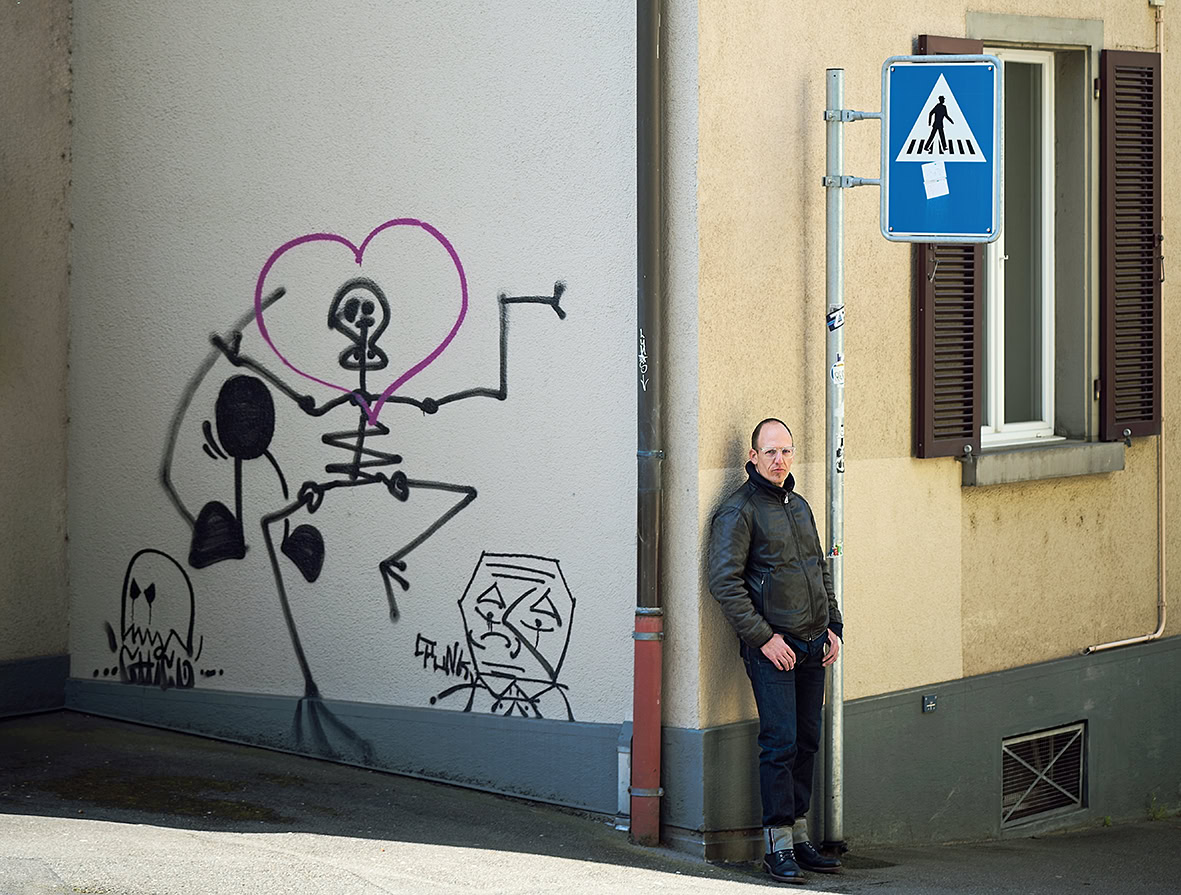
You noticed somewhere that women respond less to apocalyptic metal. What do you attribute that to?
If you ask the question polemically, you could ask: Does metal have a problem with women? Or do women have a problem with metal? Or do they both have a problem with each other? I think traditionally metal was a bit of a male alliance, kids who organized themselves in these band collectives as a conspiratorial community. And you tend to keep the others on the outside. And according to traditional gender roles, boys were more likely to be looked down upon if they went through a phase where they blew their horns, got a bit drunk, were a bit more aggressive. It was much more taboo for girls. You let the boys do metal for a few years and then they come to their senses, but with the girls you make sure they don't get into it in the first place. But that also makes it much more interesting for women, because metal is music that is not expected of them. You can break down gender stereotypes much more with metal as a woman or third gender or trans, queer, inter, whatever, precisely because it has such traditionally masculine connotations. Many female metalheads say that's exactly why they got into it.
There are many more today than there were ten or twenty years ago.
Yes, the development is going in an absolutely fantastic direction. What I always like is when diversity isn't orchestrated from above, when someone isn't watching over the equal representation of men and women, but when it develops organically. And in metal, more women are now joining bands, forming bands and are also prominent. Alissa White-Gluz from Arch Enemy, for example, is already a global icon. Something is happening. It takes time, of course, but slow processes like that are also more sustainable than if the Ministry of Culture came along and said that all metal bands must now have at least 50 percent women. That doesn't work. You can't design social groups. That makes me an anarchist again.
My big favorite isn't a metalhead, I don't even know what he prefers musically, but it's Spongebob Squarepants, the cartoon character. Spongebob says: You cannot change a person, but you can be the reason for a person to change. I find that very beautiful. Applied to women in metal: you need role models and people who are willing to feature women and write about them. Above all, you need women who actively do it themselves, who embody it.
I've always known quite a few women who were into metal. For comparison: even thirty years ago, there were far more women at a heavy metal concert than at a King Crimson concert.
Yes! I think they've always been there in metal too, they've always been on the road. But that's often not represented in the media or if it is, then it's just so clichéd, "oh, the power woman, oh, we've got another outstanding single woman, look here". Instead of people naturally looking at the music, looking at the performance, reporting on what they do. That's what Motörhead always did, by the way. I always found them absolutely likeable. They took Girlschool on tour with them, Lemmy did his duets with women. Their hearts were in the right place.
The clichés and excesses were made fun of several decades ago in "This is Spinal Tap". What do heavy metal fans think of this movie?
I don't think younger people know him that well anymore. But he's a cult figure among older people, of course. Which in turn testifies to the scene's capacity for irony. This constantly being broken by the size of your own gesture. That's a bit like the principle of metal. Death and the devil, heaven and hell, life and I don't know what all, these huge themes. And in the end it's also a ghost train, culture industry, spectacle - and simply pop. And I still really like that about metal. There's also something touching about it. Working through these big themes and in the end it's just a song with a skull on the cover.
If an interview got stuck in the 90s and 00s, all you had to do was serve up a quote from Spinal Tap and everything would run smoothly again.
My favorite scene is still the one where they get lost in the catacombs of the stadium. They run off, "rock'n'roll", run and run and when they arrive, the concert is over. Or the scene with the amplifier. These go up to eleven! Something like that never gets old.
What are you listening to now?
There are classics that I like to listen to during training, AC/DC, Guns N' Roses, Metallica. Classics that you know so well that you can forget that they're playing as a backdrop. Other than that, I haven't come across that much in the last few years that I've been blown away by. Probably a symptom of old age. I still think Chthonic from Taiwan are great. It's interesting how they discovered this actually Norwegian-identity metal and then reinterpreted it in their terms and for their background and experiences. "Aha, the Norwegians are standing up for their indigenous traditions, we should actually be doing the same here." The Norwegians have right-wing connotations, but Chthonic are left-wing. You can see how the terms and concepts shift depending on which world and region you come from. Then I still really like listening to Nashville Pussy, that's dirty pig rock, I still find it very enjoyable. Riverside, Polish, pink funky, but better than Pink Floyd. Then there's Necromorph, a German grindcore band, very solidly produced, stable, critical of capitalism, who bang very well. The dialect grindcore of Muggeseggl is really funny - they sing in Alemannic. You don't understand anything, but it's supposed to be Alemannic.
Almost Dadaisitic.
Yes, they also pose in peasant outfits in the vineyard. Then I always have Manowar relapses. It's so blatantly grotesque and embarrassing that it's awesome again. But then I often make excursions into classical music.
It's not that far away.
Exactly, it's often very close.
As a heavy metal fan, how did you end up with Straight Edge? It's much more of a punk story. (Note: A later form of hardcore punk that started in the USA, whose followers don't consume any alcohol or drugs, but instead focus on physical fitness).
Because I got into the metal scene quite early, at 13, I was confronted with this drinking very early on. And it just always disgusted me. I never liked it. As a teenager, you drink a few beers at a concert and I just didn't like the stuff. I didn't like the rituals and I especially didn't like the peer pressure that drugs and music were so directly linked. I felt under pressure. You can involve me in all sorts of things, you can work with me, you can persuade me, you can put forward arguments, and then I'm open to a lot of things. But I don't respond to pressure. And this implicit or explicit pressure, you have to drink now too, another shot after the beer, I couldn't handle that. Straight Edge was a very good way out. You could stay in this countercultural area, this rebellious area, and at the same time you didn't have to take part in the drug rituals. Even back then, I found the paradox of combining a bourgeois-ascetic-abstinent dimension with a rebellious underground dimension interesting: a totally appealing combination. And I've never distanced myself from it internally. I still stand behind it today. Too many crimes are facilitated by drugs. Soldiers are drugged in order to send them to war. Rape and sexualized violence often have to do with alcohol disinhibition. That's why I made that decision, but it had nothing to do with the music. I really like some things in Straight Edge, Strife, the album One Truth about. I love Fugazi dearly. Henry Rollins. The fascination in metal for me was clearly the music.
Is it possible that you've never experienced the apocalypse of a real hangover?
As a teenager, we experimented with getting drunk. But I quickly realized that it wasn't for me. The constructive energy of straight edge hardcore was more convincing to me. And a real apocalypse means the revelation of something new and better. A drunken stupor doesn't change anything at first. You just slowly crawl back to normal. On the other hand: a drunken stupor that makes you realize and decide to let go of the drunken stupor - that has at least minimal apocalyptic qualities.
It must have taken an insane amount of discipline to pull it off in this environment.
Yes, until today. I'm on the board of Metal Storm Concerts, and of course people drink around you. You're always the one who doesn't drink and the one who has to explain himself somehow. If you drink, you never have to explain yourself, that's part of it. When you're straight edge, you only realize how much of society is based on alcohol. On the other hand, I adore Lemmy, and he drank, and how! He was a heavy drinker. I don't believe in prohibition, you have to make the decision yourself. And that suits me just fine.
An apocalyptic last word?
The apocalypse does not actually mean doom, but revelation. That is the original meaning in the religious sense: that the last secrets will be revealed. You often overlook that when you come from those Hollywood movies with the end of the world. In this respect, Metal was a revelation for me. It really opened up a new world. To this day, I feel a certain gratitude towards this genre, even if it's a love-hate relationship, and there's a lot of embarrassing stuff in it, a lot of brashness, a lot of things that bother me. But I'm still grateful for the fact that it opened up a new world for me back then. I don't want to break this connection either. A small revelation.
Link to Jörg Scheller's playlist on Spotify
